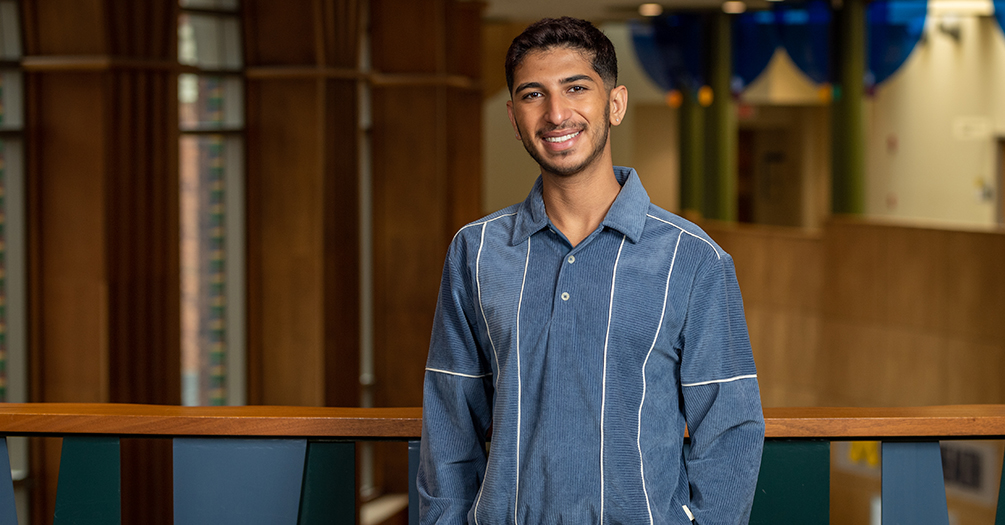Global health advocate: A journey from Michigan to Thailand

Hassan Beydoun, BS ’22
Bachelor of Science degree in Public Health Sciences
Hassan Beydoun, BS ’22, has always aspired to explore the field of public health on a global scale and one day bring the knowledge and insights he gains back to the United States.
Beydoun, a native of Dearborn, Michigan, is living out the first half of his dream in Bangkok, where he holds the position of foreign expert at Mahidol University’s Faculty of Public Health. His role primarily centers on research-related activities, involving collaborative efforts with professors and faculty members to facilitate research production and subsequent publication in academic journals.
Additionally, he maintains close collaboration with international universities, fostering research partnerships with those who aim to engage with the Faculty of Public Health.
It’s imperative to acknowledge that public health transcends geographical boundaries, and to truly attain the objective of health equity, inclusivity is paramount.”
There are numerous, valuable lessons to be learned from other countries that can be implemented in the United States, Beydoun said.
“I chose Thailand as the starting point for this journey due to its distinctive culture and well-established systems,” he said. “Thailand boasts a society and a culture that facilitate productive and efficient community-based approaches to addressing public health challenges. Thailand also has successfully implemented a comprehensive universal healthcare program, ensuring that all Thai citizens have access to healthcare services without the burden of financial concerns.”
Beydoun is interested in the complexity and multidimensional nature of public health, which led to his pursuit of comprehending and advocating for global health equity.
“I’ve observed that a significant portion of the public health content we encounter pertains to domestic issues,” he said. “It’s imperative to acknowledge that public health transcends geographical boundaries, and to truly attain the objective of health equity, inclusivity is paramount.”
Beydoun prepared for his aspirations in global health by earning a Bachelor of Science degree in Public Health Sciences at the University of Michigan School of Public Health.
Enrolling in Michigan Public Health was driven by his desire to not only share his personal narrative but also to engage with the motivating stories of fellow program participants.
“I chose to pursue my undergraduate degree at Michigan Public Health due to its exceptional faculty and a diverse cohort of students, each equipped with unique stories to share,” Beydoun said. “Not only did I learn from the faculty, but I learned a ton from my fellow students.
“The School of Public Health undergraduate program provided me with the unique opportunity to connect with individuals hailing from various corners of the world. This exposure allowed me to gain insights into previously unfamiliar issues and broaden my perspective. My experience enabled me to enhance my comprehension of the global pursuit of health equity.”
Growing up in Dearborn also influenced his interest in public health. For example, his hometown has one of the largest Arab American populations in the United States, and it also is home to steel manufacturing and several other heavy industries.
“I had asthma growing up, making me think the hospital trips were a normal part of any childhood,” he said. “I wasn’t alone—so did many of my peers and neighbors.”
Because of his lived experiences, Beydoun became committed to working toward health equity for all.
“In Dearborn today—and across the world—my community and other communities like mine are still facing the consequences of inequities among healthcare and environmental exposures,” he said. “I still suffer from respiratory issues, but I am determined to end the cycle with me.”
The School of Public Health undergraduate program provided me with the unique opportunity to connect with individuals hailing from various corners of the world. This exposure allowed me to gain insights into previously unfamiliar issues and broaden my perspective. My experience enabled me to enhance my comprehension of the global pursuit of health equity.”
As a Palestinian-American, Beydoun said he is well aware of the health inequities that communities around the world face. He said Palestinians face issues in healthcare infrastructure, mental health, water and sanitation, nutrition and food security, and maternal and child health.
“Palestinians’ access to healthcare—with movement restrictions, checkpoints and barriers limiting their ability to reach medical facilities—result in delayed and inadequate treatment,” he said. “Economic challenges and restricted movement contribute to food insecurity, particularly in Gaza, where many rely on humanitarian aid. Pregnant women and children face obstacles in accessing healthcare services, resulting in higher maternal and infant mortality rates and limited prenatal care.
“Access to clean water and sanitation is a concern due to water scarcity, resource restrictions, and inadequate infrastructure. All of these issues are important to me, whether it’s in the United States or abroad in Palestine. It is important to advocate for health equity for everyone.”
Looking back on his time at Michigan Public Health, he said it has proved to be immensely valuable in shaping his career path. The professors’ meticulous and comprehensive teaching methods have significantly enriched his understanding of public health practices.
“Their approach has instilled in me a strong sense of confidence to navigate the global public health landscape,” he said, “having equipped me with the essential tools for effective collaboration across diverse backgrounds.”
